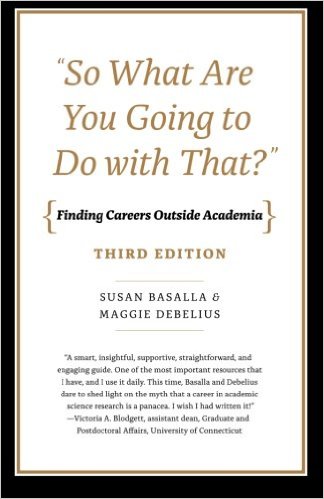| 商家名称 | 信用等级 | 购买信息 | 订购本书 |
 |
"So What are You Going to Do With That?": Finding Careers Outside Academia |  |
|
 |
"So What are You Going to Do With That?": Finding Careers Outside Academia |  |

"Basalla and Debelius use wit, directness, and great anecdotal evidence to guide readers through the soul-searching decision to leave academia." (Publishers Weekly)"
作者简介Susan Basalla received her PhD from Princeton University and has worked for the Robert Wood Johnson Foundation, America, Online, and the Art & Science Group, LLC. Currently she is a principal at Storbeck / Pimentel & Associates, LP. Maggie Debelius, who also received her PhD from Princeton University, directs the Writing Center at Georgetown University, where she also teaches in the English Department.
网友对"So What are You Going to Do With That?": Finding Careers Outside Academia的评论
I have found this to be a fantastic resource for beginning a post-academic career search, both in terms of providing practical advice (i.e. how to effectively translate a CV into a resume) and comforting advice (i.e. the authors' anchoring message that it is not impossible, or even undesirable, to transition out of higher ed).
I've already recommended this to multiple colleagues and will continue to do so.
Excellent book for anyone considering non-academic careers. I found a lot of tips in making the transition from college to a career. some of the tips are well known but others are pretty helpful. Resume writing tips were very heplful to me.
Best book for PhDs in Humanities who need to realize that they can envisage a career out of academia. Teaching is a tremendous skill.
Incredibly helpful. Highly recommend it.
For the past few years, I have been a huge proponent of the second edition of this book -- I recommend it to my grad school colleagues almost every time career planning comes up -- and I am delighted that the newly released third edition is even better. This time around, Basalla and Debelius make a conscious effort to seamlessly weave in profiles of science PhDs who have gone on to successful careers outside academia. The advice is timely and relevant given the current job market realities for science PhDs, and I appreciated that they highlight scientists in education, tech start-ups, and public policy, in addition to some of the more obvious industry applications for scientific skill sets.
Broadly speaking, this slim volume is broken down into five essential categories for grad students gearing up to succeed in a post-academic job search: Part 1 talks about mentally preparing for leaving academia and thoughtfully appraising your attitudes about your future. Part 2 lays out some solid advice for career exploration. Part 3 describes researching careers and networking (and actually manages to make networking sound not terribly painful). Part 4 covers converting your CV into a resume and includes helpful example resumes and cover letters. Finally, Part 5 has suggestions for interviewing.
The best feature of this book is the frank, no-nonsense language. This is the kind of real-world advice you would get from a wise and caring friend, if any of those wise and caring friends had the time and knowledge to walk you through the entire career development process in one go. Basalla and Debelius have clearly talked with many people who are trying to transition to a non-academic career, and they have answers for all the common questions. (e.g., "How do I take time to explore careers when my dissertation project/principal investigator rules my life?" and "What practical skills could I possibly offer an employer?") Their approach to opening their readers up to the possibility of a non-academic career trajectory is gentle, supportive, and optimistic. They make a muddled pathway seem startlingly clear.
The only thing that struck me as odd and slightly off-putting is the authors' repeated assumption that my decision to turn away from the academic grist mill is a painful and slightly humiliating experience for me. In their repeated attempts to allay these concerns, I paradoxically got the sense that I ought not be as excited about the non-academic possibilities as I am. (It's like when parents who are divorcing repeatedly assure their children that it's not their fault -- for some kids, that assurance is going to be the first invitation to consider that the divorce might be their fault.) I may be privileged to be in a research group/department/university that is slowly but very clearly embracing the idea that there are all sorts of satisfying careers for all sorts of folks, but I think sentiment comes across as a bit outdated and will surely need to be toned down in the fourth edition.
Minor criticism aside, this book is an excellent resource for people wanting a practical approach to converting the experience of earning a graduate degree into a future of earning cold, hard cash doing something other than being an overburdened assistant professor. I will continue to recommend this book to my grad school friends with reckless abandon, and I encourage anybody who wants to see the potential practical utility of arcane research to read it from cover to cover. At a slim, trim 149 pages, it is guaranteed to be worth your time.
喜欢"So What are You Going to Do With That?": Finding Careers Outside Academia请与您的朋友分享,由于版权原因,读书人网不提供图书下载服务